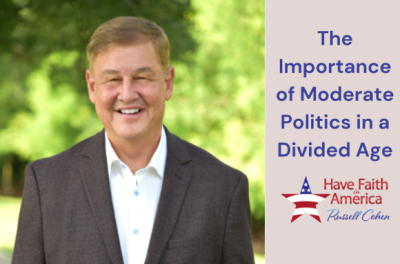 i
iThis content is paid for by an advertiser and published by CP Brand Solutions. The Christian Post newsroom was not involved in creating this content. Learn more about CP Brand Solutions.
This content is paid for by an advertiser and published by CP Brand Solutions. The Christian Post newsroom was not involved in creating this content. Learn more about CP Brand Solutions.

The Importance Of Moderate Politics In A Divided Age
As a 2023 Presidential Candidate, I wanted to take a moment to share with you some thoughts on the importance of being a political moderate.
In today's world, it can feel like everyone is taking an extreme position on the issues that matter most. Whether it is politics, social issues, or even just everyday conversations with friends and family, it can be difficult to find common ground with people who hold different views.
But I want to encourage you to consider the benefits of being a political moderate - someone who is open to hearing different perspectives, willing to consider evidence before deciding, and able to find common ground with people who hold different views.
There are many reasons why being a moderate is a good thing. Firstly, it allows us to be more independent in our thinking. Rather than blindly following a party line or ideological position, moderates can assess each issue on its own merits and make decisions based on what they believe is right.
Secondly, moderates are often better able to find common ground with people who hold different political views. This is because they are less invested in a particular ideology or party and are more focused on finding practical solutions to problems.
Thirdly, being a political moderate allows us to maintain a sense of balance and perspective, which can be enormously beneficial for our mental health. In a world where political discourse can be so toxic and divisive, it can be easy to feel overwhelmed or alienated by extreme views. By adopting a more moderate position, we can stay grounded and maintain a sense of integrity and well-being.
Finally, in a world that I see needs a Godly example, moderates are usually more consistent with the social ideals that Jesus set: 1) loving others as thyself, 2) helping one another, 3) compromise over winning, 4) selflessness, 5) being kind and 6) treating all fairly. This leads to better relationships with everyone, especially those that think differently than we do.
So, if you ever feel overwhelmed by the extremes of politics or social issues, I encourage you to consider the power of moderation. By staying open-minded, building bridges between diverse
groups, and making decisions based on your own values rather than party loyalty, you can help to create a more collaborative, inclusive world that benefits us all.
Watch this video to learn how Russell Cohen plans to unify our great nation.
IS A MODERATE PRESIDENT REALLY POSSIBLE?
While some may think there are setbacks to being a political moderate, I see these as opportunities to create real change and a way forward for our country. Here are common criticisms of being a moderate and my response:
1. My response to facing criticism from both sides: Criticism from both sides can be a sign of strength: While moderates may face criticism from both conservatives and progressives, it can also be a sign that they are successfully navigating a complex political landscape and find common ground between distinct groups. In some cases, being able to find solutions that satisfy both sides can be a sign of political compromise and leadership.
2. My response to difficulty gaining traction: Moderates can drive change: While it may be challenging for moderates to gain traction in a highly polarized political climate, there are many examples of moderates who have been able to drive change and achieve meaningful policy outcomes. By working collaboratively and seeking common ground, moderates can often build broad-based support for their ideas and bring about lasting change.
3. My response to lack of ideological clarity: Ideological clarity is not always necessary: While it can be challenging for moderates to articulate a clear ideological position, this may not always be necessary or desirable. In some cases, being able to adapt to changing circumstances and find practical solutions to complex problems may be more important than adhering to a strict ideological framework.
4. My response to compromise can be seen as weakness: Compromise is a strength, not a weakness: In a political climate where extreme views and partisan gridlock are the norm, being able to find common ground and build consensus is a valuable skill. Moderates who can navigate complex political terrain and bring together diverse groups can be seen as effective and capable leaders.
5. My response to difficulty standing out: Moderates can differentiate themselves by focusing on results: While it may be challenging for moderates to stand out in a crowded field of politicians, they can differentiate themselves by focusing on results and demonstrating their ability to achieve tangible outcomes. By highlighting their history of success and their ability to build broad-based support, moderates can build a loyal base of supporters who value their pragmatic approach to governance.
Overall, while there may be some drawbacks to being politically moderate, there are also many strengths and advantages that come with this approach. By focusing on collaboration, consensus-building, and practical solutions, moderates can play a valuable role in driving change and building a more effective and responsive government.
A LOOK AT SOME OF THE MODERATES
There have been many political candidates that chose a party to run with but that have functioned as moderates in the United States and have made significant contributions to the country. Here are a few examples:
President Joe Biden: The current President of the United States is often considered a moderate. Throughout his career and before becoming President, Biden has worked to build bridges between diverse groups and find common ground on contentious issues. He has advocated for a range of policies, from improving access to healthcare to addressing climate change, and has sought to collaborate with both Democrats and Republicans.
John McCain: The late Senator from Arizona was known for his willingness to work across the aisle and reach compromises with Democrats on issues like campaign finance reform, immigration, and climate change. McCain was a fierce critic of partisanship and tribalism and sought to put the country's interests ahead of his own party's.
Susan Collins: The Republican Senator from Maine has built a reputation as a moderate who is willing to break with her party on key issues. Collins has been a vocal advocate for healthcare reform and women's rights and has worked to pass legislation that benefits her constituents, regardless of party affiliation.
Charlie Baker: The Republican Governor of Massachusetts is widely considered a moderate. Baker has focused on issues like healthcare, education, and economic development, and has sought to find pragmatic solutions to complex problems. He has been willing to collaborate with Democrats in the state legislature and has built a reputation as a competent and effective leader.
Michael Bloomberg: The former Mayor of New York City is often seen as a moderate. Bloomberg has been a vocal advocate for issues like gun control, climate change, and public health, and has used his considerable wealth to support causes that align with his values. He has also been willing to work across party lines to achieve his goals and has sought to build bridges between diverse groups.
Other moderates are Rand Paul, Joe Manchin and Kyrsten Sinema. Most of these people have served long and remained very popular as long as they stay in the center. Perhaps, we need the same as President.

Overall, political moderates have played a key role in shaping American politics and advancing key policy initiatives. By working collaboratively and seeking common ground, they have helped to move the country forward and create a more inclusive, responsive government.
Read this article to be inspired by Christians that have been a catalyst for political change.
This article was provided by Russell Cohen for President, Moderate Independent Presidential Candidate. Visit: www.HaveFaithinAmerica.com
